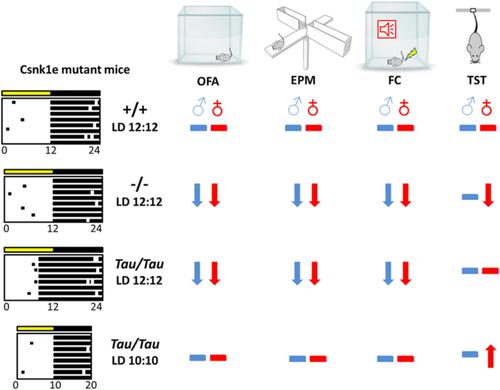当前位置:
X-MOL 学术
›
Eur. J. Nerosci.
›
论文详情
Our official English website, www.x-mol.net, welcomes your feedback! (Note: you will need to create a separate account there.)
Casein kinase 1 epsilon and circadian misalignment impact affective behaviours in mice
European Journal of Neroscience ( IF 3.4 ) Pub Date : 2021-09-12 , DOI: 10.1111/ejn.15456 Lili Zhou 1 , Karrie Fitzpatrick 1 , Christopher Olker 1 , Martha H Vitaterna 1 , Fred W Turek 1
European Journal of Neroscience ( IF 3.4 ) Pub Date : 2021-09-12 , DOI: 10.1111/ejn.15456 Lili Zhou 1 , Karrie Fitzpatrick 1 , Christopher Olker 1 , Martha H Vitaterna 1 , Fred W Turek 1
Affiliation

|
Affective behaviours and mental health are profoundly affected by disturbances in circadian rhythms. Casein kinase 1 epsilon (CSNK1E) is a core component of the circadian clock. Mice with tau or null mutation of this gene have shortened and lengthened circadian period respectively. Here, we examined anxiety-like, fear, and despair behaviours in both male and female mice of these two different mutants. Compared with wild-type mice, we found reductions in fear and anxiety-like behaviours in both mutant lines and in both sexes, with the tau mutants exhibiting the greatest phenotypic changes. However, the behavioural despair had distinct phenotypic patterns, with markedly less behavioural despair in female null mutants, but not in tau mutants of either sex. To determine whether abnormal light entrainment of tau mutants to 24-h light–dark cycles contributes to these phenotypic differences, we also examined these behaviours in tau mutants on a 20-h light–dark cycle close to their endogenous circadian period. The normalized entrainment restored more wild-type-like behaviours for fear and anxiety, but it induced behavioural despair in tau mutant females. These data show that both mutations of Csnk1e broadly affect fear and anxiety-like behaviours, while the effects on behavioural despair vary with genetics, photoperiod, and sex, suggesting that the mechanisms by which Csnk1e affects fear and anxiety-like behaviours may be similar, but distinct from those affecting behavioural despair. Our study also provides experimental evidence in support of the hypothesis of beneficial outcomes from properly entrained circadian rhythms in terms of the anxiety-like and fear behaviours.
中文翻译:

酪蛋白激酶 1 ε 和昼夜节律失调影响小鼠的情感行为
情感行为和心理健康深受昼夜节律紊乱的影响。酪蛋白激酶 1 epsilon (CSNK1E) 是生物钟的核心组成部分。该基因tau或 null 突变的小鼠分别缩短和延长了昼夜节律。在这里,我们检查了这两种不同突变体的雄性和雌性小鼠的焦虑样、恐惧和绝望行为。与野生型小鼠相比,我们发现两种突变系和两种性别的恐惧和焦虑样行为都减少了,tau突变体表现出最大的表型变化。然而,行为绝望具有不同的表型模式,女性无效突变体的行为绝望明显减少,但在tau中则不然任何性别的突变体。为了确定tau突变体对 24 小时明暗周期的异常光夹带是否导致这些表型差异,我们还检查了tau突变体在接近其内源性昼夜节律的 20 小时明暗周期中的这些行为。归一化的夹带恢复了更多类似野生型的恐惧和焦虑行为,但它导致了tau突变女性的行为绝望。这些数据表明,Csnk1e的两种突变都广泛影响恐惧和焦虑样行为,而对行为绝望的影响因遗传、光周期和性别而异,这表明Csnk1e的机制影响恐惧和焦虑的行为可能相似,但不同于影响行为绝望的行为。我们的研究还提供了实验证据,支持从焦虑样和恐惧行为方面适当引入昼夜节律的有益结果的假设。
更新日期:2021-09-12
中文翻译:

酪蛋白激酶 1 ε 和昼夜节律失调影响小鼠的情感行为
情感行为和心理健康深受昼夜节律紊乱的影响。酪蛋白激酶 1 epsilon (CSNK1E) 是生物钟的核心组成部分。该基因tau或 null 突变的小鼠分别缩短和延长了昼夜节律。在这里,我们检查了这两种不同突变体的雄性和雌性小鼠的焦虑样、恐惧和绝望行为。与野生型小鼠相比,我们发现两种突变系和两种性别的恐惧和焦虑样行为都减少了,tau突变体表现出最大的表型变化。然而,行为绝望具有不同的表型模式,女性无效突变体的行为绝望明显减少,但在tau中则不然任何性别的突变体。为了确定tau突变体对 24 小时明暗周期的异常光夹带是否导致这些表型差异,我们还检查了tau突变体在接近其内源性昼夜节律的 20 小时明暗周期中的这些行为。归一化的夹带恢复了更多类似野生型的恐惧和焦虑行为,但它导致了tau突变女性的行为绝望。这些数据表明,Csnk1e的两种突变都广泛影响恐惧和焦虑样行为,而对行为绝望的影响因遗传、光周期和性别而异,这表明Csnk1e的机制影响恐惧和焦虑的行为可能相似,但不同于影响行为绝望的行为。我们的研究还提供了实验证据,支持从焦虑样和恐惧行为方面适当引入昼夜节律的有益结果的假设。


























 京公网安备 11010802027423号
京公网安备 11010802027423号